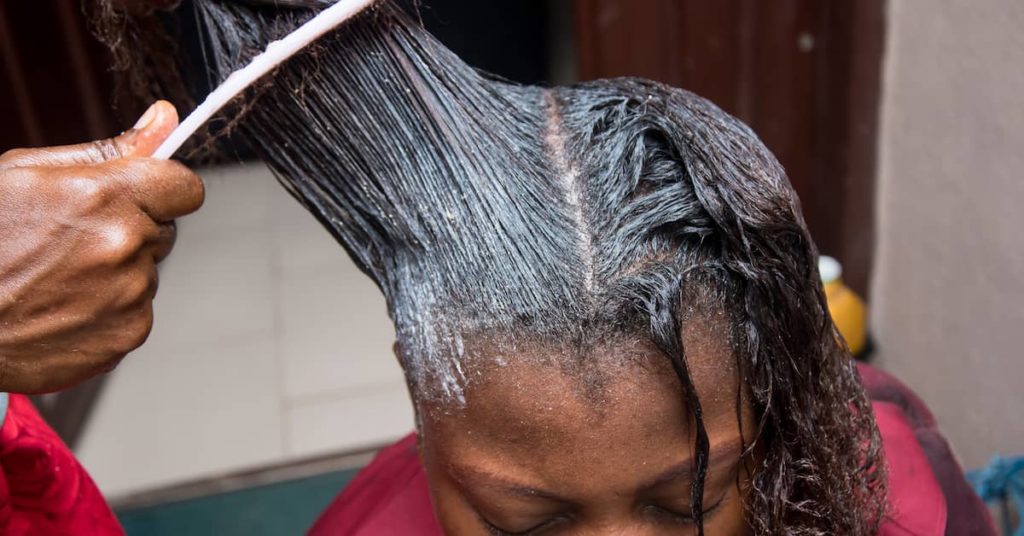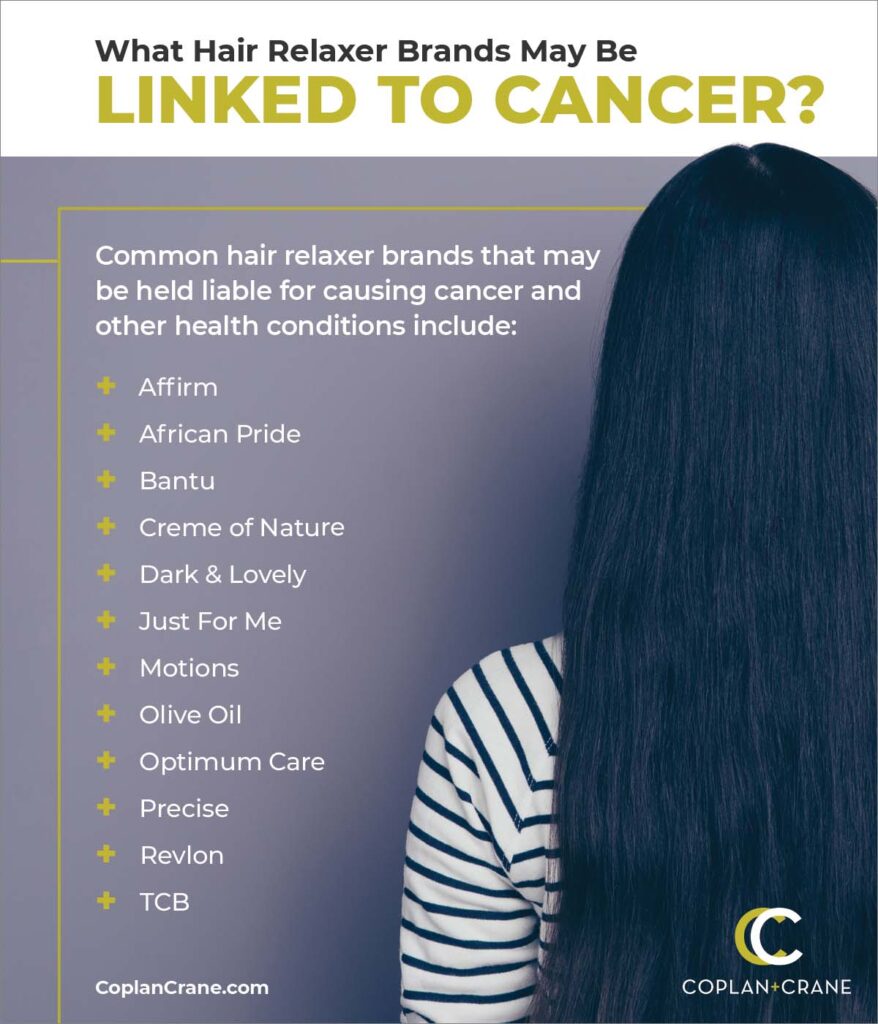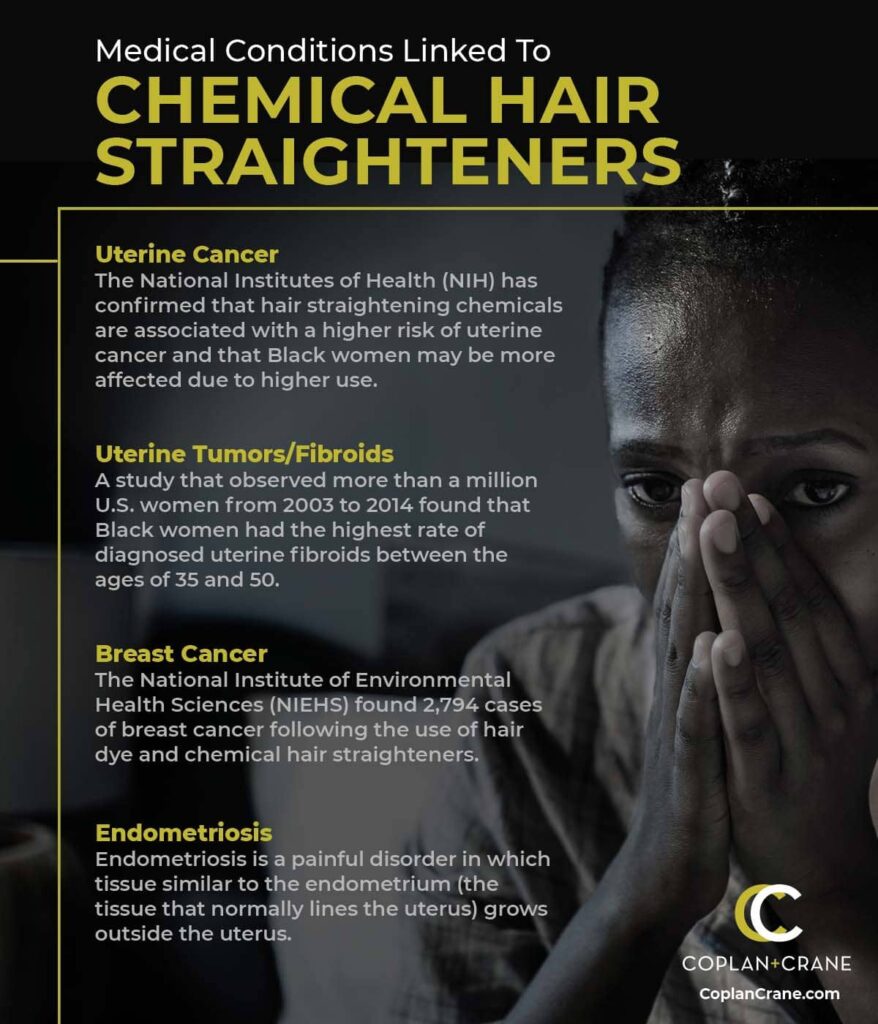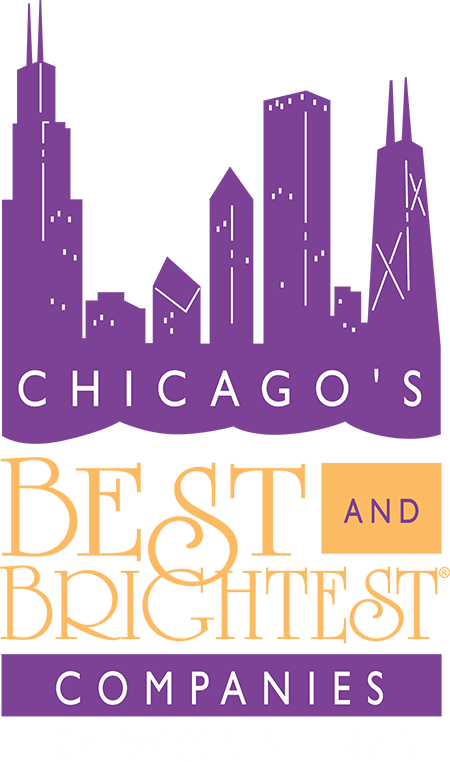Hair Relaxer Lawsuit Lawyers Serving Consumers Throughout Illinois and the Nation
The chemical hair straightener lawsuit attorneys at Coplan + Crane are investigating cases on behalf of individuals who used hair relaxers and have been diagnosed with uterine cancer, uterine tumors and fibroids, breast cancer, and endometriosis.
A recent study published in the Journal of the National Cancer Institute reports an increased risk of uterine cancer among people who frequently use hair straightening chemicals or relaxers. Often used repeatedly by Black women, Hispanic women, and others to help style wavy or curly hair, chemical hair relaxers are now shown to put many users at risk for uterine cancer, uterine tumors and fibroids, endometriosis, and breast cancer.
If you have used hair relaxers or hair straighteners in the past and have been diagnosed with cancer or another health condition, contact Coplan + Crane today by using the form on this page or calling (708) 358-8080 for a free case evaluation. We welcome clients from Chicago, Oak Park, Rockford, and other areas throughout Illinois and the nation. We handle these cases on a contingency fee basis, which means you don’t pay us unless we recover compensation for you.

Is There a Lawsuit Against Chemical Hair Straighteners?
Hair straightener/hair relaxer lawsuits are in the very early stages. Coplan + Crane is currently accepting cases for potential litigation against a variety of retail relaxer brands. We help individuals – predominantly Black women – who have used these products and suffered harm as a result.
A recent study published in the Journal of the National Cancer Institute found that frequent users of chemical hair straightening products are more than twice as likely to develop uterine cancer than those who don’t use those products. In the study, “frequent use” of hair straightening products was defined as more than four uses a year.
These findings are particularly alarming for Black women, who use hair straightening products more than other groups. Rates of uterine cancer and subsequent deaths are on the rise in the U.S., with death rates highest among non-Hispanic Black women.
Hair product manufacturers have an obligation to meet the rigorous safety standards expected of cosmetic products to avoid causing harm to consumers. Users of chemical hair straighteners are owed safe products. The cancer-causing defects described in recent studies may be the grounds for legal action to pursue compensation for physical, financial, and emotional losses.

What Hair Relaxer Brands May Be Linked to Cancer and Other Health Conditions?
Legal actions against hair relaxers/hair straighteners could involve any manufacturer of these products.
Chemical hair straighteners generally contain materials associated with higher cancer risk, including parabens, phthalates, formaldehyde, and metals. These substances may be more easily absorbed through abrasions and scalp burns frequently caused by hair relaxers.
Common hair relaxer brands that may be held liable for causing harm include:
- Just For Me
- Motions
- Optimum Care
- Dark & Lovely
- TCB
- Bantu
- Revlon
- African Pride
- Olive Oil
- Creme of Nature
- Affirm
- Precise
These products are aggressively marketed to Black women, who have long been told that they must use these products to meet society’s standards. The companies that profit off Black women without regard for their safety should be held accountable for their reckless and negligent actions.
The chemical hair straightener lawsuit attorneys at Coplan + Crane are committed to helping consumers recover the maximum compensation to which they may be entitled under the law. If you used hair relaxers and suffered a health condition, we want to hear your story.
Do I Have a Case?
Anyone who used chemical hair straighteners or relaxers and was later diagnosed with a qualifying health condition may be eligible for potential litigation. Black women, Hispanic women, and other women are predominantly at risk of harm from these products.
What Medical Conditions Are Linked to Chemical Hair Straighteners?
Harmful exposure to chemical hair straighteners and relaxers places consumers at elevated risk for medical conditions including but not limited to:
Uterine Cancer
Uterine cancer is cancer located in the uterus. Uterine cancer is the most common cause of cancer in the female reproductive system, accounting for nearly 3% of all new cancer cases. Studies have shown that rates of uterine cancer are on the rise in the U.S., particularly among Black women.
While research has found that 1.64% of women who never used hair relaxers developed uterine cancer by the age of 70, 4.05% of frequent users of chemical hair straighteners developed uterine cancer by the same age.
The National Institutes of Health (NIH) has confirmed that hair straightening chemicals are associated with a higher risk of uterine cancer and that Black women may be more affected due to higher use.
Treatment for uterine cancer may involve:
- Hysterectomy
- Lymph node removal
- Radiation therapy
- Chemotherapy
- Hormone therapy
- Targeted therapy
- Anti-angiogenesis therapy
- Mammalian target of rapamycin (mTOR) inhibitors
- Immunotherapy
In addition to physical challenges, the financial and emotional cost of uterine cancer can be high. The chemical hair straightener lawsuit attorneys at Coplan + Crane can help you pursue compensation for undue expenses you incurred as a result of negligent hair care product manufacturers.
Uterine Tumors/Fibroids
Uterine fibroids are noncancerous growths of the uterus that typically develop during childbearing years. Uterine tumors or fibroids can range in size. In some cases, they are bulky masses that enlarge and distort the uterus, while in other cases they are so small that they are undetectable by the human eye.
Women can develop just one fibroid or multiple fibroids. In extreme situations, multiple fibroids can enlarge the uterus to the point of reaching the rib cage and adding weight.
A study that observed more than a million U.S. women from 2003 to 2014 found that Black women had the highest rate of diagnosed uterine fibroids between the ages of 35 and 50. It is estimated that 80% of Black women will develop fibroids over their lifetime.
Treatment for uterine fibroids may involve:
- Abdominal myomectomy
- Laparoscopic myomectomy
- Hysteroscopic myomectomy
- Vaginal hysterectomy
- Abdominal hysterectomy
- Laparoscopic hysterectomy
- Uterine artery embolization (UAE)
If you were diagnosed with fibroids and underwent any of the treatments listed above after using hair relaxers, contact Coplan + Crane now for a free case evaluation.
Breast Cancer
Utilizing data from the Sister Study, the National Institute of Environmental Health Sciences (NIEHS) found 2,794 cases of breast cancer following the use of hair dye and chemical hair straighteners. Among Black women, using permanent dyes every five to eight weeks or more was associated with a 60% increased risk of breast cancer as compared with an 8% increased risk for white women.
Black women tend to be diagnosed with breast cancer at a younger age than white women.
According to the most recent data available, the median age for breast cancer diagnosis for Black women was 60, compared to 64 for white women.
Treatment for breast cancer may involve:
- Mastectomy
- Double mastectomy
- Lumpectomy
- Sentinel node biopsy
- Axillary lymph node dissection
- Radiation therapy
- Chemotherapy
- Hormone therapy
- Targeted therapy
- Immunotherapy
Breast cancer, and its treatment, are among the most alarming experiences a woman can face in her lifetime. If you used chemical hair straighteners and were later diagnosed with breast cancer, complete the form on this page for a free case review. Our attorneys may be able to help you recover the justice and compensation you deserve.
Endometriosis
Endometriosis is a painful disorder in which tissue similar to the endometrium (the tissue that normally lines the uterus) grows outside the uterus. Roughly 20% to 50% of women who receive treatment for infertility have endometriosis. The condition can cause infertility, increased risk of miscarriage, chronic pain, and painful urination and bowel movements.
Treatment for endometriosis may involve:
- Hysterectomy
- Conservative surgery
- Hormone therapy
- Pain medication
The effects of endometriosis can impact your physical and financial well-being, as well as the future of your family. If you have undergone endometriosis treatment, or you have suffered infertility or a miscarriage after using chemical hair relaxers, complete the quick form on this page today. Our attorneys may be able to help you recover financial compensation for your considerable losses.

How Our Chemical Hair Straightener Lawsuit Attorneys Can Help
Coplan + Crane is an award-winning law firm devoted to making the world safer by winning for those who have lost. With our extensive and proven knowledge of law, science, and medicine, our team is uniquely qualified to handle complex cases involving chemical hair straighteners and their related medical conditions.
As a consumer, you are owed a basic duty of care by the makers of products like hair relaxers. The failure of manufacturers to sell products that are safe and free of unnecessary health risks – or to warn of potential risks – can make them liable for damages you suffered as a result of their negligence.
By completing the quick form on this page, you will receive a free case evaluation. We can help you understand your rights and legal options. We can help you recover the compensation you need to get your life back on track and hold those responsible for your injuries accountable for their negligence.
Contact a Chemical Hair Straightener Lawsuit Attorney in Chicago for Free
If you used chemical hair straighteners or hair relaxers and have been diagnosed with cancer or another medical condition, complete the easy form on this page now for a FREE case evaluation.
See our results.
Coplan + Crane is a distinguished personal injury law firm that welcomes clients from Chicago, Oak Park, Rockford, and other areas throughout Illinois and the United States.













